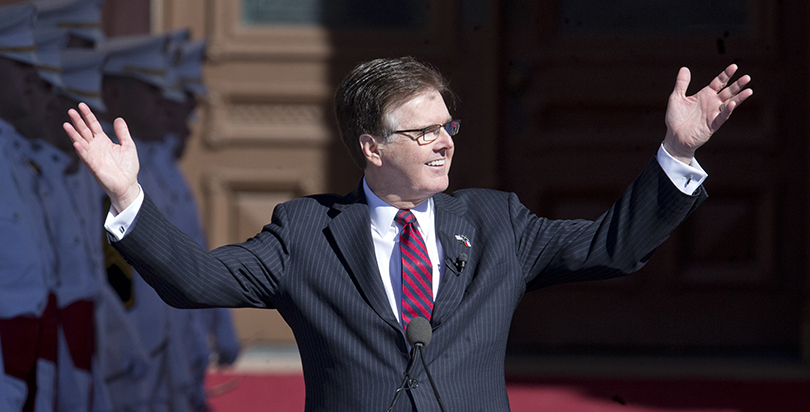Texas GOP Primes for New Voucher Battle, as State’s Top Elected Officials Prioritize School Choice Bill

With the backing of the state’s top two elected officials, Republican leaders in Texas have moved to expand school choice across the state after years on the losing side.
Senate Education Committee Chairman Larry Taylor, a Republican, introduced a bill last week that would allow students to attend private or religious schools using voucher-like programs that draw on taxpayer funds.
The two-part bill would create Education Savings Accounts, similar to those in five other states that allow parents to choose how to use the state’s per-pupil education funding for their child. Taylor’s bill would allow the funds to be used for tuition and other school-related costs. Students from low-income families would get 75 percent of the state’s allotment; those with disabilities would get 90 percent.
Additionally, the bill would provide tax credits to businesses whose donations would be used to fund private school scholarships. As with the ESAs, scholarships would cover up to 75 percent of the per-pupil funding average. The total amount of tax credits in the first year, 2018, would be capped at $100 million, with the cap increasing 10 percent each year.
“We have unlimited school choice in Texas today, [but only] for those who can afford it,” Taylor said, unveiling the proposal at a press conference on January 30. “And we do have excellent schools in Texas, but we have some schools that frankly are not providing the best opportunity for their students,” he continued. “This legislation will level the playing field for parents who are desperate for more choices but who are limited because of their own resources.”
Critics argue that vouchers handicap public schools by diverting funds to private schools that have little or no accountability. Proponents say that educational choices are best left up to parents, who hold schools accountable by choosing new ones when they are dissatisfied.
Taylor can count on support from someone who once also served as the Senate Education committee chair — Republican Lt. Gov. Dan Patrick, who has long championed voucher-like measures.
Gov. Greg Abbott announced his intention to sign Taylor’s bill should it arrive at his desk. It must first move out of a Senate committee and reach the House, which has blocked similar measures in recent years.
Abbott has suggested that choice programs could ease Texas’s special-education woes in the wake of an investigation by the Houston Chronicle last year that found the state Department of Education had limited the number of special-needs students receiving extra support.
When asked by reporters why his bill would fare better than others that have died in committee in recent years, Taylor said that “more pressure is being applied” and more information about choice is available since 2015, the last time the House and Senate faced off on the issue.
The December retirement of Rep. Jimmie Don Aycock, the Republican chairman of the House Public Education Committee, who had staunchly resisted such measures, could also give House lawmakers an opening to consider Taylor’s request.
House Speaker Joe Straus, meanwhile, has said he will “keep an open mind” on school choice initiatives, including charter schools, whose funding advocates are pushing to expand in the current session.
(The 74: As Political Winds Shift in Texas, Charter Advocates Plan 2017 Push for Funds to Build New Schools)
Opponents, including the Texas State Teachers Association and the Texas Association of School Boards, reacted strongly to the bill’s unveiling; the teachers union called it “an attack on public education.”
Raise Your Hand Texas, an advocacy group, dubbed the bill “a school voucher on steroids.”
Senate Bill 3 is among several voucher-like measures legislators will debate this session, The Texas Tribune reports, including two tax-credit scholarship bills backed by the Texas Catholic Conference of Bishops and the Texas Private Schools Association.
Senators will also take up a charter school funding bill introduced in January by Sen. Donna Campbell, a Republican. Her proposal would increase facilities funding for charters, allowing thousands of children on charter waiting lists to enroll. Currently charters are restricted from tapping the same state funding streams for facilities that traditional public schools access.
Naomi Nix contributed to this report.
Get stories like these delivered straight to your inbox. Sign up for The 74 Newsletter

;)
